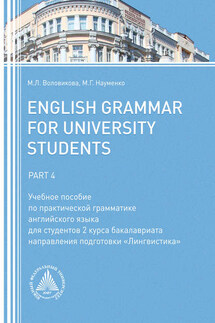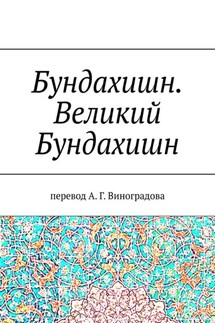English Grammar for University Students. Part 4 - страница 11
b) of manner
In this syntactic function Gerunds are preceded by the prepositions by and in:
He achieved success by studying hard.
I spent the Sunday in writing an essay.
с) of attendant circumstances
In this syntactic function Gerunds are preceded by the preposition without,besides, in addition to, instead of [Шрамко, Степанова, 2009 ].
He left without paying the bill.
You’d better think it over instead of arguing.
d) of purpose
In this syntactic function Gerunds are preceded by the preposition for.
He put on the glasses for reading the newspaper.
е) of condition
In this syntactic function Gerunds are preceded by the preposition without or the phrase in case of [Шрамко, Степанова, 2009 ].
I can’t defend this case without your fully trusting me.
In case of changing your mind, please, tell us about it.
f) of cause
In this syntactic function Gerunds are preceded by the prepositions for, for fear of, owing to, because of, through [Шрамко, Степанова, 2009].
For fear of being critisized she left the meeting.
g) of concession
In this syntactic function Gerunds denote some obstacles in spite of which the action of the finite form is carried out and are preceded by the preposition in spite of, despite.
In spite of being tired she went on working.
Despite sending his applications regularly, he couldn’t get a job.
7. Parenthesis
In this syntactic function the Gerund is preceded by the conjunction as and the preposition for (as for) [Шрамко, Степанова, 2009].
As for discussing this matter with them, I’d prefer not to do that.
Predicative constructions (complexes) with the gerund
In predicative constructions the Gerund is in predicate relation to а nounor аpronoun. A noun can be used either in the common or genitive case:
I appreciate my friend’s helping me (my friend helping me).
In the Gerundial complex it is possible to use
– the possessive pronoun:
I appreciate his helping us.
– the personal pronoun in the objective case
I appreciate him helping us.
– an indefinite, defining or negative pronoun:
I don’t remember anybody (anybody’s) saying it.
He boasted of having beaten his rival at tennis.
We were surprised atall coming to meet us.
We apologize for nobody having explained anything to you.
– а reflexive pronoun.
She couldn’t stop herself crying.
NB. At present it’s more common to use the Common case of a noun instead of the Genitive case and the objective case of the personal pronoun instead of the possessive pronoun.
I don’t mind him joining us.
We objected to John leaving.
Predicative constructions are usually rendered in Russian by а subordinate clause.
Тне gerund & тне infinitive
The Gerund and the Infinitive have much in common since they both have some nominal and some verbal features. However, in the Infinitive the verbal nature is more prominent, whereas in the Gerund the nominal one. The basic difference in their meaning is that the Gerund is more general, whereas the Infinitive is more specific and more bound to some particular occasion [Кобрина, Корнеева, 2009].






